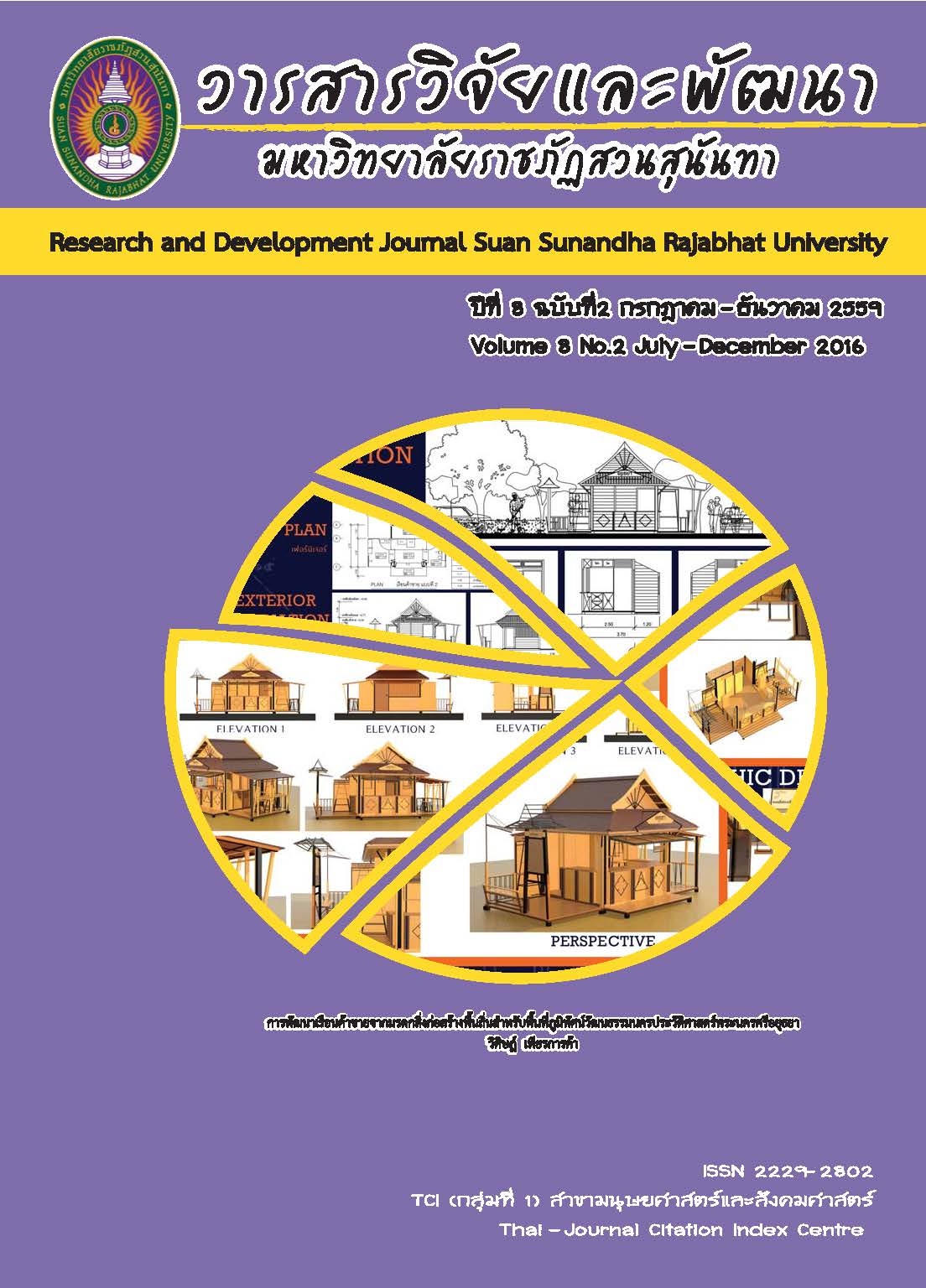การพัฒนารูปแบบการบริหารหลักสูตรที่มีประสิทธิผล ของโรงเรียนมัธยมศึกษาขนาดใหญ่ในภาคตะวันออกเฉียงเหนือตอนบน
คำสำคัญ:
การพัฒนารูปแบบ, การบริหารหลักสูตร, ประสิทธิผลของหลักสูตร, ภาคตะวันออกเฉียงเหนือ ตอนบน, โรงเรียนมัธยมศึกษาขนาดใหญ่บทคัดย่อ
การวิจัยนี้เพื่อ ศึกษาและพัฒนารูปแบบ การบริหารหลักสูตรที่มีประสิทธิผลของโรงเรียนมัธยมศึกษาขนาดใหญ่ในภาคตะวันออกเฉียงเหนือตอนบนและตรวจสอบรูปแบบการบริหารหลักสูตรที่มีประสิทธิผล การดาเนินการวิจัยมี 4 ระยะ ได้แก่ ระยะที่ 1) การศึกษาองค์ประกอบของรูปแบบ โดยการวิเคราะห์เอกสารและงานวิจัยที่เกี่ยวข้อง การสัมภาษณ์ผู้ทรงคุณวุฒิ จานวน 9 คน และศึกษากรณีตัวอย่างจากโรงเรียนดีเด่น จานวน 2 โรงเรียน ระยะที่ 2) การพัฒนารูปแบบ โดยใช้เทคนิคเดลฟายเครื่องมือที่ใช้ในรอบที่ 1 เป็นแบบสอบถาม วิเคราะห์ข้อมูลด้วยความถี่ รอบที่ 2 และ 3 เป็น
แบบสอบถามชนิดมาตราส่วนประมาณค่า 5 ระดับ โดยหาค่ามัธยฐาน และ ค่าพิสัยระหว่างควอไทล์ระยะที่ 3) ตรวจสอบรูปแบบโดยผู้มีส่วนเกี่ยวข้อง จานวน 783 คน ที่ใช้แบบสอบถาม มาตราส่วนประมาณค่า 5 ระดับ และระยะที่ 4) เป็นการยืนยันรูปแบบโดยการประชุมผู้เชี่ยวชาญจานวน 7 คนผลการวิจัยพบว่า รูปแบบการบริหารหลักสูตรที่มีประสิทธิผลฯ ประกอบด้วย 3 องค์ประกอบ คือ1) ปัจจัยสนับสนุนการบริหารหลักสูตรที่มีประสิทธิผล มี 7 ด้าน 2) กระบวนการบริหารหลักสูตรมี 4 ขั้นตอน และ 3) ประสิทธิผลการบริหารหลักสูตร มี 3 ด้าน และรูปแบบการบริหารหลักสูตรที่มีประสิทธิผล มีความเหมาะสม อยู่ในระดับมาก ทั้งโดยรวมและรายองค์ประกอบ เรียงลาดับค่าเฉลี่ยจาก
มากไปหาน้อย คือ กระบวนการบริหารหลักสูตร ประสิทธิผลการบริหารหลักสูตร และปัจจัยสนับสนุนการบริหารหลักสูตร
เอกสารอ้างอิง
factors affecting organizational
effectiveness of the Supervisory
Unit of the Department of
General Education. Doctor of
Philosophy Program in Education
Administration Graduate School,
Chulalongkorn University.
Chaiwanichsiri, K. (1999). Administrator
Factors Related to the
Effectiveness of Private Schools.
Doctor of Education Degree in
Educational Administration, at
Srinakharinwirot University.
Chareonwongsak, K. (2013). Super
Leadership. 2nded. Bangkok: Success
Media Co.,Ltd.
Churngchow, C. (1998). An Analysis of the
Structure of Factors Affecting the
Islamic Private School Effectiveness
in Southern Border Provinces.
Songklanakarin Journal of Social
Sciences and Humanities. 4(2).
131-157.
Dessler, G. (2004). Management,
Principles and Practices for
Tomorrow’s Leaders. NJ: Pearson
Education.
Grudmanee, T. (2007). An Analysis of
Factors Affecting the
Organizational Effectiveness of
School-based Management
Schools Under the Office of Basic
Education Commission. Doctor of
Philosophy Program in Education
Adminitration Graduate School,
Chulalongkorn University.
Haiman, G. and Connor, E. (1985).
Mangement (5thed.). Boston:
Houghton Miffin Company.
Hallinger, P. & Joseph, M. (1985). Assessing
the Instructional Management
Behavior of Principals. New York:
Teachers College Press, Columbia
University.
Intaraksa, P. (2007). The Concept and
Theory of Personnel Development.
Bangkok: Expernet Co.,Ltd.
Jazzar, M., and Algozzine, B. (2007). Keys
to successful 21st century
ducational leadership. Boston:
Pearson.
Manomaiphibul, T. (2007). Creating Vision
and Strategy. Searched on August
8, 2015 from
http://www.teerachon.com/.
Meeporn, S. (2009). A Research and
Development of Knowledge
Management Manual for School
Curriculum Administration. Doctor of
Education Dissertation in Educational
Administration Graduate School,
Khon Kaen University.
Ministry of Education. (2009). The Basic
Education Core Curriculum B.E. 2551.
Bangkok: The Agricultural Co-operative
Federation of Thailand, Co.,Ltd.
Nilwan. K. (2010). The Components of
Academic Leadership for
Education School Principals
Effecting Management to Schools
of Bangkok Education. Doctor of
Education Degree in Educational
Administration and Leadership,
ST.John’s University.
Office of the Permanent Secretary. (2008).
Human Resource Development
Strategic. Bangkok: Office of the
Permanent Secretary.
Plarin, K. (2009). Development of
Instructional Leadership
Indicators for Basic Education
School Principals. Doctor of
Education Thesis in Educational
Administration Graduate School,
Khon Kaen University.
Pongsrirojana, S. (1997). Organization and
Management (6thed.). Bangkok:
Technic.
Prongprommarot, J. (2016). Variables Affecting
a Level of Practice and Quality of
Educational Quality Assurance in Basic
EducationSchool. Journal of
Education Mahasarakham University.
10(1), 44-49.
Sakonsinsiri, M. (2010). The Teacherquality
Development In a Basic Education
School: A Participatory Action
Research. Education Doctoral Degree,
Major Educational Administration, Khon
Kaen University.
Sanrattana, W. (2003). Education
Administration: Principle Theory
Functional and Analysis. Bangkok:
Tipwisuth.
Steer, R.M. (1977). Organization
Effectiveness: A Behavior View.
Santa Monica, CA: Goodyear
Publishing Company Inc.
Stogdill, Ralph M. (1974). Handbook of
Leadership: A Survey of Theory
and Research. New York: The Free
press.
Suntiwong, T. (1995). Organization and
Management (6thed.). Bangkok:
Thaiwatanapanich Co.,Ltd.
Thamronglertrit, P. (2010). Curriculum
Administration for Schools:
Administration for Good Management.
Al-nur Journal the Graduate School
of Fatoni University. 8(15), 147-149.
Trachoo, P. (2011). The Development of
Indicators for Instructional
Leadership Behaviors of
Municipal School Principals.
Rajabhat Maha Sarakham University
Journal; RMU.J. 5(2). 9-19.
Wachirasukmongkol, B. (1993). Human
Relationship In Guidance.
Phitsanulok: Naresuan University.
Waehachat, R. (2009). Academic
Administration In Basic Education
(3rded.). Songkhla: Numsilp
Advertise Co.,Ltd.
Wiwattananont, S. (2006). The Multi-level
Factors Affecting the
Effectiveness of the Government
Secondary Schools in the
Bangkok Methropolis. Doctor of
Education Thesis in Educational
Administration Graduate School,
Vongchavalitkul University.
Yavirach, N. (2003). Modern Management.
Bangkok: Centralexpress Co.,Ltd..
ดาวน์โหลด
เผยแพร่แล้ว
รูปแบบการอ้างอิง
ฉบับ
ประเภทบทความ
สัญญาอนุญาต
บทความที่ได้รับการตีพิมพ์เป็นลิขสิทธิ์ของ สถาบันวิจัยและพัฒนา มหาวิทยาลัยราชภัฎสวนสุนันทา
ข้อความที่ปรากฏในบทความแต่ละเรื่องในวารสารวิชาการเล่มนี้เป็นความคิดเห็นส่วนตัวของผู้เขียนแต่ละท่านไม่เกี่ยวข้องกับมหาวิทยาลัยราชภัฎสวนสุนันทา และคณาจารย์ท่านอื่นๆในมหาวิทยาลัยฯ แต่อย่างใด ความรับผิดชอบองค์ประกอบทั้งหมดของบทความแต่ละเรื่องเป็นของผู้เขียนแต่ละท่าน หากมีความผิดพลาดใดๆ ผู้เขียนแต่ละท่านจะรับผิดชอบบทความของตนเองแต่ผู้เดียว





